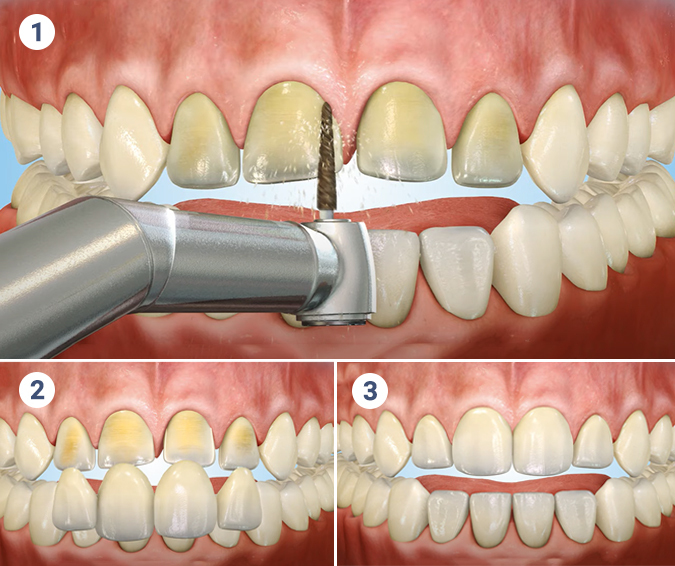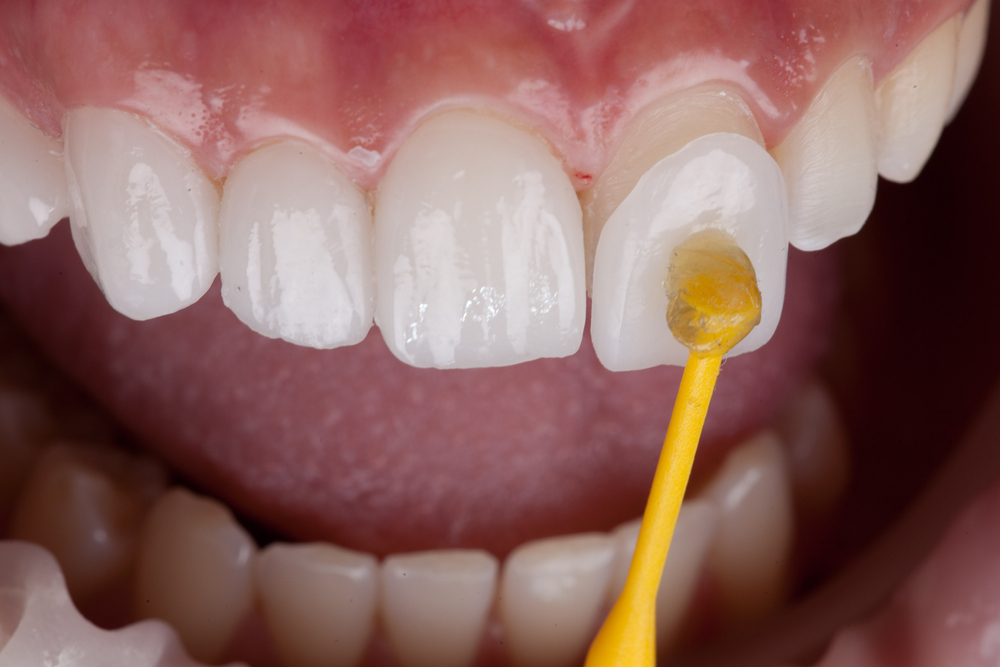Unlocking the Secrets of Veneers: Truths, Kinds, and Advantages for an Attractive Smile
Veneers supply a compelling option for those seeking to improve their smiles. These oral improvements can address numerous flaws, from discoloration to misalignment. With alternatives like porcelain and composite, people can choose based upon their choices and requirements. Understanding the subtleties of veneers, including application and treatment, is necessary. What variables should one think about before choosing? The solutions might amaze those curious about this visual dental alternative.

Comprehending Veneers: What Are They?
Veneers are thin, customized coverings created to cover the front surface of teeth, improving their look. Generally crafted from sturdy products, these coverings are customized to fit each individual's teeth specifically. They serve multiple functions, including dealing with aesthetic imperfections such as staining, chips, or voids. The application process involves a dental practitioner preparing the teeth, frequently by eliminating a tiny quantity of enamel to ensure a tight fit. When prepared, the veneers are bound to the teeth utilizing a solid adhesive.
People usually pick veneers for their capability to develop a natural-looking smile while providing a resilient option to oral blemishes. Unlike other aesthetic dental care alternatives, veneers require very little invasive procedures, making them a popular selection. The outcome is an enhanced smile that can substantially boost an individual's confidence and self-worth. In general, veneers supply an efficient strategy to achieving a more unified and attractive oral look.
Sorts of Veneers: Porcelain vs. Compound
When taking into consideration cosmetic dental options, two main kinds of veneers stand out: porcelain and composite. Porcelain veneers are crafted from a long lasting ceramic product that simulates the natural appearance of teeth. They are understood for their tarnish resistance and ability to show light similarly to natural enamel, providing a visual appeal that numerous people desire. The application procedure commonly includes more prep work of the tooth framework and might call for multiple brows through to the dental professional.
On the other hand, composite veneers are made from a tooth-colored resin that is directly related to the teeth. This type enables for quicker application and can frequently be completed in a single visit. While they are cheaper than porcelain veneers, they may not offer the same longevity or resistance to staining. Ultimately, the choice in between porcelain and composite veneers depends on private preferences, spending plan, and particular oral needs.
The Benefits of Deciding On Veneers
Picking veneers uses various advantages that can significantly improve both the aesthetic appeals and capability of a person's smile. Among the main advantages is their capability to correct imperfections such as staining, voids, and imbalance, resulting in a more uniform look. Veneers can also improve the sturdiness of teeth, offering a safety layer that guards them from damages.
They call for marginal tooth prep work contrasted to other oral procedures, maintaining more of the all-natural tooth framework. This preservation adds to a much healthier dental setting while still achieving a stunning smile.
Veneers are extremely personalized, allowing individuals to select the form, dimension, and shade that best fits their choices. Additionally, they are stain-resistant, making it much easier to preserve a appealing and intense smile in time. Generally, veneers present an effective alternative for those seeking both cosmetic enhancement and lasting dental health benefits.
The Veneer Application Process
The veneer application process involves numerous essential actions to guarantee ideal results. At first, a consultation is carried out to assess the client's needs, complied with by the prep work and shaping of the teeth. The veneers are bonded in place, with changes made for a perfect fit and appearance.
Preliminary Consultation Steps
A complete preliminary examination is vital for anyone taking into consideration veneers, as it sets the foundation for a successful therapy. During this conference, the dental expert examines the individual's dental health and wellness, going over any type of existing issues that can affect the veneer application. This assessment might consist of X-rays and a visual assessment to establish the problem of the gums and teeth.
The dental expert also engages the person in a detailed discussion about their visual objectives, choices, and expectations. They may provide numerous veneer choices tailored to the client's details requirements. Furthermore, the professional describes the procedure, possible dangers, and aftercare requirements, ensuring that the patient is comfortable and educated before waging the treatment.
Prep Work and Forming Teeth
After the preliminary examination, the following stage involves the prep work and shaping of the teeth to suit the veneers. This essential step is done by the dental professional, that meticulously examines the tooth framework to figure out the amount of enamel that needs to be gotten rid of. Commonly, a thin layer, generally around 0.5 millimeters, is shaved off to guarantee an appropriate suitable for the veneers. Accuracy is critical throughout this process, as it affects both the general convenience and the visual end result. Once the teeth are appropriately shaped, impressions are taken to develop personalized veneers that line up perfectly with the patient's oral account. This careful prep work establishes the phase for an effective veneer application, boosting both look and function.
Bonding and Last Modifications
Adhering to the shaping and preparation of the teeth, the bonding procedure begins, marking a crucial phase in the veneer application. During this phase, a dental adhesive is applied to the prepared tooth surface area, ensuring a solid bond in between the veneer and the tooth. The dental practitioner meticulously positions the veneer, making adjustments to attain the wanted alignment and aesthetic appeals. Once appropriately positioned, a special light is made use of to heal the adhesive, solidifying the bond. After healing, the dentist conducts last modifications, cutting any excess product and improving the veneer's shape to guarantee a natural appearance. This cautious focus to information boosts both function and looks, adding to an overall lovely smile that is sturdy and lasting.
Caring for Your Veneers: Upkeep Tips
Caring for veneers is essential to maintain their look and long life. A consistent day-to-day cleaning regimen, mindful avoidance of staining foods, and regular dental exams are vital elements of effective upkeep. These techniques aid ensure that veneers remain in peak problem and remain to boost one's smile.
Daily Cleaning Regimen
Consistently preserving veneers is necessary for their longevity and appearance. A correct everyday cleansing regimen can help maintain their sparkle and stop damages. Dental professionals recommend brushing twice a day with a soft-bristled toothbrush and fluoride toothpaste, making certain that all surfaces are cleaned carefully to stay clear of scratching the veneer surface. Flossing day-to-day is additionally vital to get rid of food fragments and plaque from between teeth, where brushes might not reach. Furthermore, utilizing an antimicrobial mouthwash can help keep oral health without hurting the veneers. It is recommended to prevent unpleasant cleansers and tools that can scratch the veneer. By following these simple steps, individuals can maintain their veneers looking lovely while advertising total oral wellness.
Avoiding Discoloration Foods
Veneers are developed to improve the appearance of teeth, their susceptibility to discoloring demands cautious dietary selections. It is crucial for people with veneers to be mindful of particular foods and beverages that can result in discoloration. Dark-colored things such as coffee, red white wine, and berry juices ought to be consumed in moderation, as they are known to stain both natural teeth and veneers. Additionally, acidic foods like citrus fruits container weaken the bonding agents used in veneers, making them much more vulnerable to staining. To maintain a bright smile, it is a good idea to wash the mouth with water after consuming discoloration foods and to practice routine oral hygiene. These thoughtful choices add significantly to the long life and looks of veneers.

Regular Oral Examinations

Preserving the integrity of veneers calls for a dedication to regular dental exams, as these appointments play a necessary function in guaranteeing their long life and appearance. During these sees, oral experts can assess the problem of the veneers, looking for any indicators of wear, damages, or underlying dental issues. Additionally, regular cleanings help remove plaque and tartar that can accumulate around the veneers, visit homepage advertising total oral health. Dentists can additionally provide tailored suggestions on treatment methods and products suited for veneer maintenance. By sticking to a timetable of exams, individuals can deal with potential troubles early, guaranteeing their smile remains lively and beautiful. Eventually, normal dental check outs are a crucial element of veneer treatment.
Is Veneers the Right Choice for You?
Making a decision whether veneers are the right choice typically depends upon you could try here private visual goals and dental needs. For those seeking to resolve issues such as staining, chips, or imbalance, veneers can supply a transformative option. Candidates usually include individuals with healthy and balanced teeth yet want an improved smile.
It is vital to take right into account factors such as tooth enamel condition, the degree of dental problems, and the readiness to maintain veneers. Consulting with an oral professional is crucial, as they can examine oral health and determine if veneers are appropriate
Furthermore, potential prospects should reflect on the long-term commitment, as veneers may call for replacement every 10-15 years. Price considerations also play a considerable duty, as veneers can be a considerable financial investment. Ultimately, the decision must be knowledgeable, stabilizing visual desires with practical factors to consider for enduring results.
Often Asked Inquiries
The Length Of Time Do Veneers Generally Last Prior To Requiring Replacement?
Veneers typically last between 10 to 15 years prior to needing replacement. Factors such as dental health, way of life selections, and material quality can affect their durability, making more information normal dental examinations vital for keeping their condition.
Are Veneers Safe for Individuals With Sensitive Teeth?
Veneers can be risk-free for individuals with delicate teeth, but it often depends on the seriousness of sensitivity and the dentist's strategy. Consulting a dental professional prior to continuing is vital to guarantee excellent outcomes.
Can Veneers Be Removed or Changed Conveniently?

Do Veneers Spot Over Time, and Just How Can I Stop It?
Veneers can discolor with time, especially from foods and drinks like coffee or red a glass of wine. To protect against discoloration, maintaining excellent oral hygiene, using a straw for beverages, and normal dental cleanings are advised methods.
What Is the Cost Range for Obtaining Veneers?
The price of veneers commonly ranges from $500 to $2,500 per tooth, depending on variables such as product kind, dental expert experience, and place. Clients must talk to dental specialists for personalized quotes and financing options.
As soon as the teeth are effectively formed, impacts are taken to develop customized veneers that line up flawlessly with the client's dental profile. Throughout this phase, a dental adhesive is used to the prepared tooth surface area, guaranteeing a solid bond between the veneer and the tooth. It is essential to take into account factors such as tooth enamel problem, the degree of oral issues, and the willingness to keep veneers. Veneers can be safe for people with delicate teeth, but it commonly depends on the seriousness of level of sensitivity and the dental practitioner's strategy. The cost of veneers commonly varies from $500 to $2,500 per tooth, depending on aspects such as product type, dental professional experience, and area.